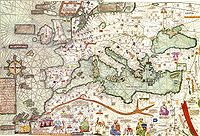- Mediterranean Lingua Franca
-
lingua franca Spoken in Tunisia, Greece, Cyprus Region Mediterranean Basin Extinct 19th century Language family Pidgin, Romance based- lingua franca
Official status Regulated by No official regulation Language codes ISO 639-3 pml Linguasphere 51-AAB-c The Mediterranean Lingua Franca or Sabir ("know") was a pidgin language used as a lingua franca in the Mediterranean Basin from the 11th to the 19th century.[1]
Contents
History
The Mediterranean Lingua Franca is the original basis for the word lingua franca. The name "lingua franca" in Italian means "free" or "open language" (in the sense of "without boundaries"). The generic description "lingua franca" has hence become common for any language used by speakers of different languages to communicate with one another. The other name of the language, Sabir, comes from the Italian word "saper" for "to know", of Romance origin.[2]
Based mostly on Italian and a bit of Provençal in the eastern Mediterranean at first, it later came to have more Spanish and Portuguese elements, especially on the Barbary coast (today referred to as the Maghreb). It also borrowed from Turkish, French, Greek and Arabic. This mixed language was used for communication throughout the medieval and early modern Middle East as a commercial and diplomatic language. It was also the language used among slaves of the bagnio, Barbary pirates and European renegades in pre-colonial Algiers. Historically the first to use this language were the descendants of the genoese and venetian colonies in the eastern Mediterranean, in their commerce trade with middle eastern populations after the year AD 1000.
As the use of Lingua Franca spread in the Mediterranean, dialectal fragmentation emerged, the main difference being more use of Italian and Provençal vocabulary in the Middle East, while Ibero-Romance lexical material dominated in the Maghreb. After France became the dominant power in the latter area in the 19th century, Algerian Lingua Franca was heavily gallicised (to the extent that locals are reported having believed that they spoke French when conversing in Lingua Franca with the Frenchmen, who in turn thought they were speaking Arabic), and this version of the language was spoken into the nineteen hundreds, witness Schuchardt. Holm's suggestion that it was this variety of Lingua Franca which through relexification developed into Algerian French seems somewhat far-fetched – as can be seen from Lanly's study, Algerian French was indeed a dialect of French, although Lingua Franca certainly had had an influence on it. Nevertheless, there is no doubt that Lingua Franca did have an impact on Algerian French. Lingua Franca also seems to have had an impact on other languages. Eritrean Pidgin Italian, for instance, displayed some remarkable similarities with it, in particular the use of Italian participles as past or perfective markers. It seems reasonable to assume that these similarities have been transmitted through Italian foreigner talk stereotypes.[3]Some samples of Sabir have been preserved in Molière's comedy, Le Bourgeois gentilhomme. Hugo Schuchardt was the first scholar to investigate the Lingua franca systematically. According to the monogenetic theory of the origin of pidgins he pioneered, Lingua Franca was known by Mediterranean sailors including the Portuguese. When Portuguese started exploring the seas of Africa, America, Asia and Oceania, they tried to communicate with the natives by mixing a Portuguese-influenced version of Lingua Franca with the local languages. When English or French ships came to compete with the Portuguese, the crews tried to learn this "broken Portuguese". Through a process of relexification, the Lingua Franca and Portuguese lexicon was substituted by the languages of the peoples in contact.
This theory is one way of explaining the similarities between most of the European-based pidgins and creole languages, like Tok Pisin, Papiamento, Sranan Tongo, Krio, and Chinese Pidgin English. These languages use forms similar to sabir for "to know" and piquenho for "children".
Lingua Franca left traces in today's Algerian slang and Polari. Polari, from Italian parlare ("to talk"), was a cant used by fairground Travellers, showpeople, London variety artists and gay people.
Example of "Sabir"
An example of Sabir (or Mediterranean Lingua Franca) can be read on Molière's comedy, Le Bourgeois gentilhomme:
Sabir..................Italian, Spanish (English)
Se ti saber.........se tu saper, si tu saber (if you know)
ti responder,.......tu responder, tu responder (you answer,)
se non saber.......se non saper, si no saber (if you don't know)
tazir, tazir...........taci, taci, cállate (be silent)Notes
Bibliography
- Dakhlia, Jocelyne, Lingua Franca - Histoire d'une langue métisse en Méditerranée, Actes Sud, 2008, ISBN 2742780777
- John A. Holm, Pidgins and Creoles, Cambridge University Press, 1989, ISBN 0521359406, p. 607
- Henry Romanos Kahane, The Lingua Franca in the Levant: Turkish Nautical Terms of Italian and Greek Origin, University of Illinois, 1958
- Hugo Schuchardt, Pidgin and Creole languages : selected essays by Hugo Schuchardt (edited and translated by Glenn G. Gilbert), Cambridge University Press, 1980. ISBN 0521227895.
See also
External links
- A Glossary of Lingua Franca, fifth edition, 2005, Alan D. Corré. It includes articles about the language from various authors.
- Sample texts from Juan del Encina, Le Bourgeois Gentilhomme, Carlo Goldoni's The Impresario from Smyrna, Diego de Haedo and other sources.
- The glossary itself
- Tales in Sabir from Algeria
- Lingua franca in the Mediterranean (Google book)
- An introduction to Lingua Franca
Categories:- Languages of Europe
- Pidgins and creoles
- Languages of Algeria
- Extinct languages of Africa
- Extinct languages of Europe
Wikimedia Foundation. 2010.

